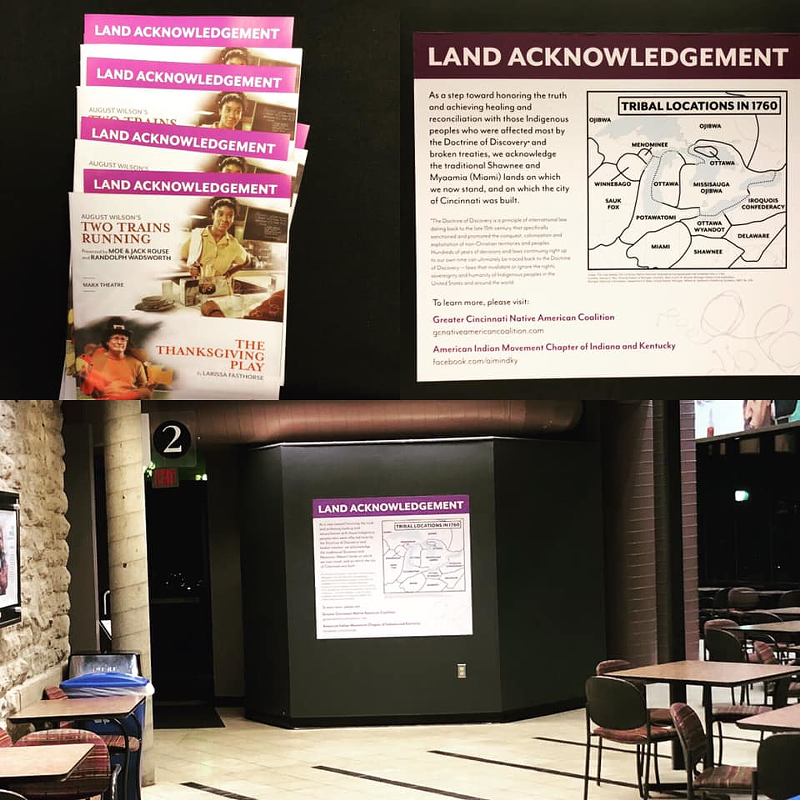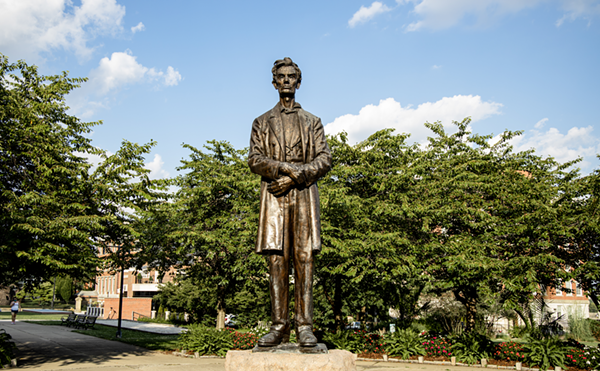
If you've been to a recent show at the Playhouse in the Park, you may have noticed a new addition in their programs: a "Land Acknowledgment."
"As a step toward honoring the truth and achieving healing and reconciliation with those Indigenous Peoples who were affected most by the Doctrine of Discovery* and broken treaties, we acknowledge the traditional Shawnee and Myaamia (Miami) lands on which we now stand, and on which the City of Cincinnati was built," the notice reads.
That notice was first incorporated into their programming during Larissa Fasthorse's The Thanksgiving Play. Fasthorse was the first Native American playwright to have a work produced at the theater. And the play itself follows a group of liberal artists as they try to create a culturally sensitive Thanksgiving play.
As critic Rick Pender wrote upon seeing the show, "It’s a flat-out satire on political correctness gone mad... It’s the story of four caricatured, liberal white people (they call themselves 'enlightened white allies') who intend to create a devised script for a junior high school. We see them on the first day of rehearsal as they try to craft a sensitive and appropriate work."
During the play's run — it closed April 21 — discussions and community nights were held to both engage and educate audiences. And a larger land acknowledgment was displayed in the playhouse's lobby. But the gesture is one that will continue to appear in their programs.
“It is our intention to include it in programs going forward," says Blake Robison, artistic director. "I think a point that needs to be made — and the conversation I’ve had with some of the patrons — is that we at the Playhouse don’t have a political agenda. But we do have a strong commitment to making the theater a welcoming and accessible place to all of Cincinnati’s diverse citizens."
"I think, sometimes, organizations assume they’re welcoming and inclusive because why wouldn’t you be? We’re all open-minded and strive to serve the community," he continues. "But if you take time to reach out to groups that are often underrepresented in your audience base (you find) that you have to go the extra mile.”
The Doctrine of Discovery referenced was the basis used to colonize and seize land not inhabited by Christians. It was first used in 1493 by Pope Alexander VI to justify Christain Europeans explorers' claims on the land they "discovered" and would later occupy, even if other people were there first. Aside from the Americas, it was used in Africa, Asia, Australia and New Zeland.
The Playhouse's Robison noted that the acknowledgment has appeared in both their current shows' programs — You're a Good Man, Charlie Brown and Tiny Houses — and will carry on to future seasons.
“I think with this sort of engagement, it’s important that the institution isn’t calling the shots," Robison says. "We don’t want to go out to any community and say, ‘Here’s our prepackaged thing we have for you.' Anyone in this field will tell you that the most important thing to do is to listen first and find out what that particular community is interested in, what are their concerns."
With the land acknowledgment, he said that came out of conversations with Fasthorse and other local organizations, most notably the Greater Cincinnati Native American Coalition, who created the statement (as well as the lobby display that was up throughout The Thanksgiving Play's run).
Robison says the gesture was of "vital importance" for the organization, in terms of remembering and acknowledging the history of the exploitative doctrine.
In the front lobby, he also mentions that they have a welcome slide that reminds people that all patrons — no matter their race, religion, gender identity, sexual orientation, ability and background — are welcome.






